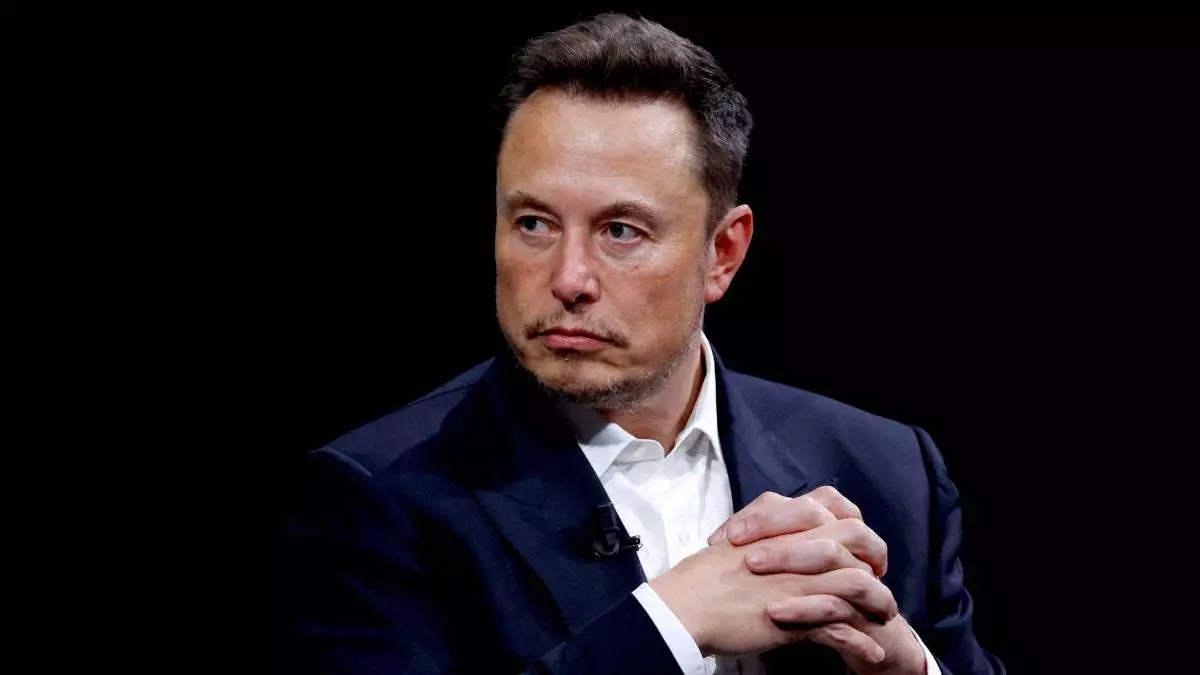The financial world is a cauldron of intense scrutiny, particularly when it involves public figures such as Elon Musk. Recently, the U.S. Securities and Exchange Commission (SEC) has initiated actions against Musk after he failed to attend a scheduled court-ordered testimony in relation to his $44 billion acquisition of Twitter. This situation raises critical concerns regarding the accountability of high-profile individuals and the implications of regulatory oversight in financial markets.
On a seemingly routine Friday, the SEC filed a motion in a federal court in San Francisco that could lead to severe penalties against Musk. The regulator’s filing asserts that Musk failed to inform them until mere hours before the scheduled September 10 testimony that he would not be attending. Instead, he chose to oversee SpaceX’s Polaris Dawn mission at Cape Canaveral, a decision that the SEC believes reflects a lack of seriousness regarding his obligations. According to the regulatory body, Musk was already aware of the planned launch days in advance, prompting the SEC to question the validity of his excuse as mere “gamesmanship.”
The SEC’s allegations suggest that the billionaire’s actions are part of a pattern of delaying tactics aimed at avoiding scrutiny. In the filing, SEC lawyer Robin Andrews criticized Musk’s behavior as unconstructive, arguing that it undermines the integrity of legal procedures designed to hold influential figures accountable. This raises a pivotal question: Should individuals, regardless of their status, be held to the same legal standards as everyone else when it comes to compliance with regulatory subpoenas?
Musk’s attorney, Alex Spiro, characterized the prospect of sanctions as “drastic” and unwarranted. He argues that Musk’s absence was essentially due to an unavoidable emergency linked to his professional commitments, which he claims were necessary for the safety of astronauts. Spiro asserts that Musk’s testimony has been rescheduled for October 3, alleviating concerns about any long-term implications of his initial absence. This defense speaks to the complexities of balancing significant business responsibilities with the legal obligations that come with being a high-profile figure.
Moreover, Spiro emphasizes that there is no chance a similar situation will arise again, suggesting that the SEC’s concerns about Musk’s future compliance may be overstated. Still, the layers of complexity in Musk’s case are emblematic of a larger narrative involving public figures and their interactions with regulatory bodies. Musk’s history of clashes with the SEC, particularly in light of previous legal disputes, paints a broader picture of an individual often at odds with regulatory frameworks.
Past Controversies and the Ongoing SEC Inquiry
The SEC’s pursuit of Musk is not a new phenomenon; it reflects ongoing concerns about his compliance with securities regulations. Following Musk’s accumulation of Twitter stock in early 2022, there was substantial criticism regarding his delay in disclosing his ownership stake to investors. While laws mandate that investors disclose when their holdings exceed 5% of a public company, Musk reportedly waited until he owned 9.2% of Twitter before making any formal announcements. His subsequent comments, claiming misunderstandings about disclosure requirements, only fuel skepticism among critics.
The SEC’s investigation delves deeper into whether Musk’s actions constituted a violation of securities laws. The question remains whether his alleged missteps originated from genuine confusion or from a strategic desire to manipulate market reactions. Musk’s tumultuous history with the SEC, marked by a high-profile settlement in 2018 over misleading tweets regarding Tesla’s privatization, sets the stage for heightened scrutiny and skepticism regarding his claims of harassment by regulators.
Elon Musk’s ongoing struggles with the SEC underline a significant issue in the interplay between regulatory authorities and influential business figures. The prospect of sanctions underscores the challenges regulators face in enforcing compliance among those who operate at the highest echelons of wealth and power. As the October 3 testimony approaches, all eyes will be on Musk and the implications of this case for future regulatory actions against high-profile individuals. The outcome could not only influence Musk’s businesses but also set a precedent for how regulatory bodies handle cases involving substantial public interest and accountability. As history unfolds, the resolution of this controversy may reshape the landscape of corporate governance and compliance, reminding us all of the importance of transparency and responsibility in the financial world.


Leave a Reply